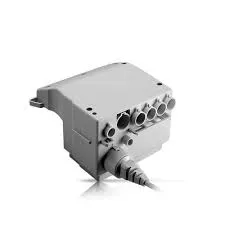The Role of Cotton Tape in Electrical Insulation
In the dynamic world of electrical engineering, safety and reliability are paramount. One of the often-overlooked materials that contribute significantly to electrical insulation is cotton tape. This versatile and eco-friendly option has been utilized in various applications, ranging from home wiring to industrial systems, helping to ensure that electrical components operate efficiently and safely.
Composition and Characteristics
Cotton tape, as its name suggests, is made primarily from cotton fibers. This natural material offers several inherent advantages for electrical insulation. For one, cotton is an excellent dielectric material, meaning it resists the flow of electric current. This property helps to prevent short circuits and reduces the risk of electrical fires, making cotton tape a reliable choice for insulating wires and cables.
Moreover, cotton tape is flexible and can conform to various shapes, making it ideal for wrapping around uneven surfaces or complex wiring configurations. Its fibrous texture also provides a robust grip, ensuring that it adheres well to surfaces without slipping or unraveling over time.
Application in Electrical Insulation
Cotton tape is commonly used in the electrical insulation of coils, transformers, and other components where heat generation could be a concern. In these applications, the cotton acts as a barrier, protecting sensitive wires from external elements and reducing the risk of overheating. Additionally, cotton tape can be used in conjunction with other insulation materials to offer layered protection, enhancing the overall durability and effectiveness of the electrical system.
cotton tape for electrical insulation

Beyond traditional applications, cotton tape is also employed in the manufacturing of electric vehicles, renewable energy systems, and high-voltage installations. As industries transition towards more sustainable practices, the eco-friendly nature of cotton tape becomes an attractive alternative to synthetic materials, which may not be as environmentally friendly.
Advantages Over Synthetic Insulation
When compared to synthetic insulation materials, cotton tape offers several distinct advantages. One of the most significant benefits is its biodegradability. While synthetic materials can take decades to decompose, cotton tape breaks down naturally, reducing the environmental impact once it is disposed of. Additionally, cotton has a lower carbon footprint during production, making it a more sustainable choice for electrical insulation.
Furthermore, cotton tape is less prone to cracking in extreme temperatures. Synthetic insulations can become brittle over time, especially in harsh environments, whereas cotton remains resilient, maintaining its insulating properties under various conditions. This durability enhances the longevity of electrical components, reducing maintenance costs and extending the lifespan of devices.
Conclusion
In conclusion, cotton tape is an invaluable material in the realm of electrical insulation. Its natural properties, combined with its versatility and eco-friendliness, make it an ideal choice for a variety of electrical applications. As the push for sustainability in manufacturing and electrical engineering continues to grow, the relevance of cotton tape is likely to increase. Organizations seeking to enhance safety while minimizing their environmental impact would do well to consider cotton tape as a primary insulating solution. Whether in industrial settings or residential wiring, cotton tape stands out as a reliable, efficient, and environmentally responsible choice for electrical insulation.
-
Self Amalgamating Tape: Redefining Electrical Insulation and ProtectionNewsAug.07,2025
-
Seal Strip Solutions: Revolutionizing Energy Efficiency and Comfort in Modern BuildingsNewsAug.07,2025
-
High Voltage Electrical Tape: Powering Safety and Reliability in Modern InstallationsNewsAug.07,2025
-
Flex Tape Waterproof: Transforming the Future of Instant RepairsNewsAug.07,2025
-
Elevate Electrical Safety Standards with High-Performance PVC Electrical TapeNewsAug.07,2025
-
Butyl Rubber Tape: The Ultimate Solution for Reliable Sealing and WaterproofingNewsAug.07,2025
